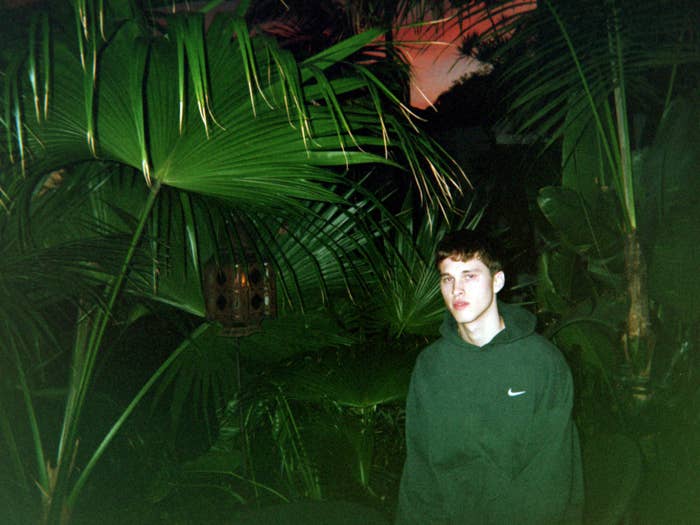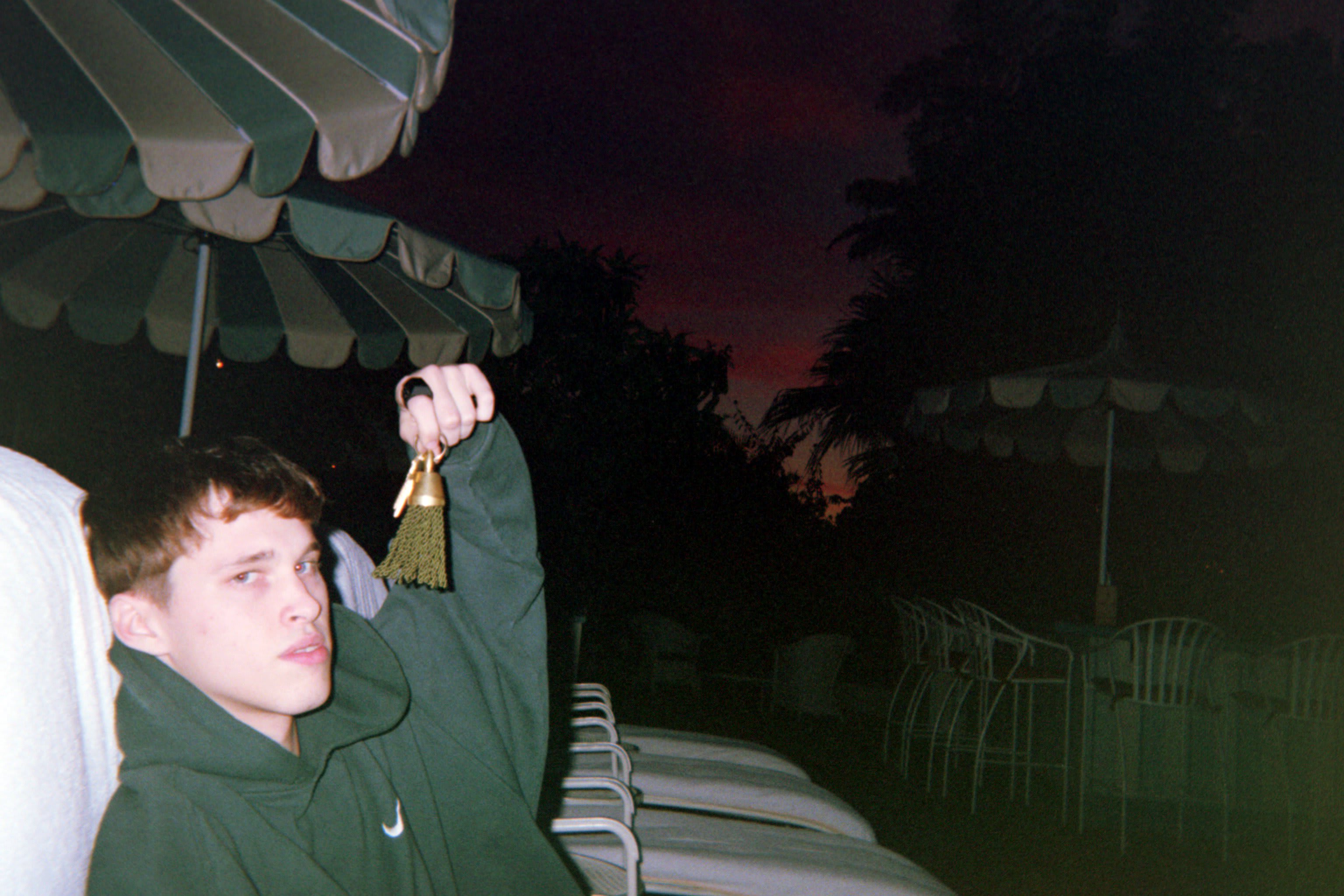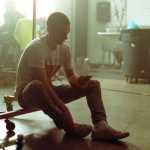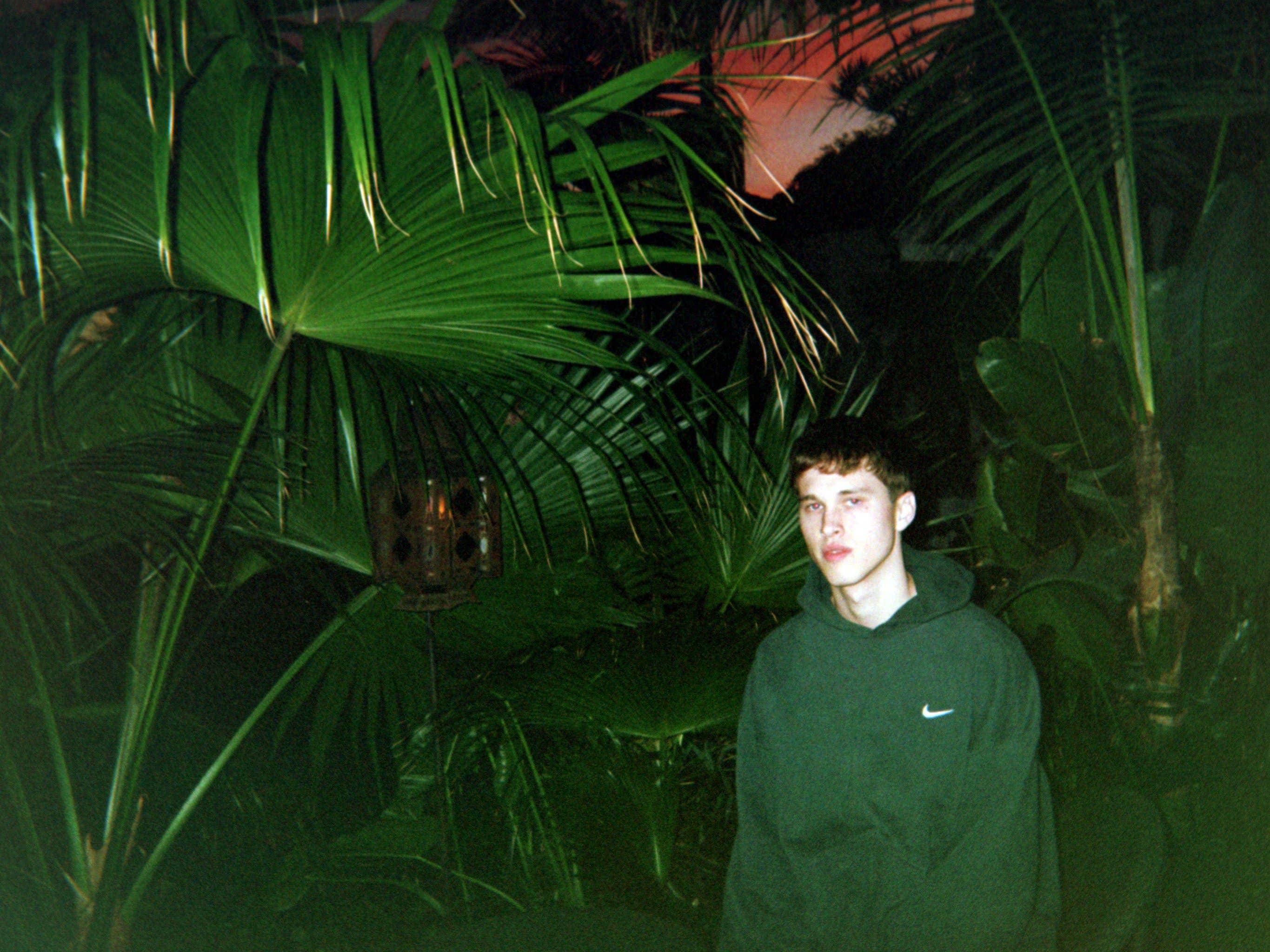
“We’ve seen a lot of demonic forces around here.” Ryan Beatty grins at a private joke as we wind through Chateau Marmont’s leafy paths. The 24-year-old songwriter had been spending a lot of time here, one of Hollywood’s most fabled and (allegedly) haunted hotels. Was he seeing ghosts? “No, a different kind of demon.”
He’s in the midst of another “staycation.” Beatty lives in Los Angeles, but he’s at the luxe hotel because Kevin Abstract rents a suite here to make music for weeks at a time. That’s a difficult invitation to turn down, especially when Brockhampton's Q3 production duo of Jabari Manwa and Kiko Merley are in residence.
And most importantly, Beatty can make his own musical choices. It wasn’t always that way. His musical journey started a little more than ten years ago, when Beatty took interest in the YouTube videos his older sister was making. He liked the reactions, but not the harassment. So he started his own channel, and became an early example of the online star system, swept bangs and all. Placements with Disney soon followed, and by 2014 Beatty had built a sizable following.
It came at a cost. By 2015, he was feeling less like a kid and more like a product—and increasingly uncomfortable in the roles laid out for him to play. So Beatty bailed before child stardom could do any serious damage, and retreated from music altogether. “I feel like when I was younger I gave all of myself and all of my personality to what I did, and at that time I didn't even really know myself.”
That changed soon after Beatty’s self-imposed exile. He came out as gay to his fans on Instagram in 2016 and began crafting his debut album, Boy In Jeans. Released in 2018, it’s full of lush harmonies and vulnerable songwriting, a celebration of beauty. Luminaries had already taken note: Beatty appeared on late night TV with the Brockhampton boys a month before the album’s release to perform "SUGAR," and Tyler, the Creatortook a special interest in the track “Party’s Over.”
For a while though, that was the last we heard of Ryan Beatty. There was no big tour accompanying Boy in Jeans—he was already in the midst of recording a followup, Dreaming of David. He retreated into himself, nurturing an inner life. “I understand myself more and more as time goes on,” Beatty wrote in a press release. “I’m not as worried about past emotions.”
When I finally follow Merley to find Beatty at the Chateau, my host does seem relaxed—blissful, even. The album is done, due out in a few days’ time, and he’s in the midst of an unrestrained creative spell. Kevin and Q3 are setting up in the living room, with phone conversations and birdsongs filtering in from the balcony. It’s a hive of music, and Ryan Beatty has the right disposition for a productive spate matching even Brockhampton's 2017 SATURATION streak. In a word, he’s obsessed. Music is “all I do, every single day,” he says. “It's all I think about.”
As we begin the interview in an adjacent room, Beatty’s eyes dart to the door when a particular loop starts to catch his ear. He ends up asking the other room for quiet. If there’s music in the vicinity, he can’t help but zero in—part of what Beatty calls his “scatterbrain.” Read the interview below and listen to Dreaming of David here.
How do you cope with your scatterbrain on a daily basis?
My scatterbrain is what makes me constantly create, because my brain is just craving to see something new all the time. So I guess if I were to do something to change that I would be afraid. You know how it is when you really focus on something, especially when you care about it? My brain just attacks it.
Were you always singing as a kid?
Singing is something that I've just naturally always been good at. So from a young age, it's something I always did. It was instinct, like it was very primal to me.
When I was a teenager, I saw people my age getting popular from YouTube, but I never saw that for myself. My sister actually had a channel and I would just post stuff on there. I got abuse from there, so then I was like, "Oh, I'll just make my own channel."
It was the consistency that got people to keep coming back. We're talking 2011, so it feels so far away yet straight up like yesterday, in the blink of an eye.
How many siblings do you have?
I have four older sisters and a younger brother. I have a huge family and awesome nephews and nieces. They all protect me.
I want to go back to that performance on Jimmy Fallon with Brockhampton. It was an incredible reveal, because you had been out of the public eye for so long. Not many people knew where you stood on music or if you still even wanted to be an artist. Was that ever the case?
I feel like I give my entire life to this. It's all I do, every single day. It's all I think about. My artistry completely blends in with my real life, there's no separation for me. I don't think that's a great thing, but I always say it's amazing that I do something that affects me as much as this does. I lay awake at night thinking about the music. I can't sleep sometimes because I'm thinking about it.
None
And it’s endless. The more you learn, the more you realize how much there is left to learn.
For sure. I love everything I've learned. I'm always just trying to listen and take things in. And I'm nowhere near the best I could possibly be. But that's also what excites me, because I feel like I'm continually getting better in my own way.
For Dreaming of David, you mostly worked with two members of Slow Hollows, Austin Anderson and Daniel Fox. When did you know you were going to make a lot of the album with them?
I really liked Austin as a person. We share a lot of similarities in the way that we hear music and how we take it in and enjoy it. But he also knows a lot more of another side of music than I do. He has his own influences and his own point of views in a very strong way. He really is opinionated in his ideas, and I liked that. I liked seeing that confidence and I wanted to really work with someone that was pushing me.
Instead of just saying yes to everything.
Exactly. I realized I needed to work with someone that challenged me, but I also already had a friendship with Austin. And then he introduced me to Daniel. We made “Backseat” during the second day of my first session with Daniel.
After getting signed, there’s a moment of wanting to use all the resources you can. You want to let people do their jobs and put you in rooms with other people, but it wasn't really adding up for me. I knew I wanted to make a departure from Boy in Jeans. I just felt like my ear was listening for something else.
The last album, I had nothing to lose, man. This time around I was like, "Okay, I feel confident in myself as an artist. I want to push myself really hard.” I felt like I had bought myself a little time to make something. So that's what I did.

I saw you use the word “meticulous” in describing the album. You cover a lot of sonic ground, so it’s interesting to me that you ended up working with such a small group.
I never know what genre my music is. I never know what to call it. It's going to make a lot of sense once you see the bigger picture. I knew “Dark Circles” was my most polarizing song, and I wanted to come back with that after Boy in Jeans. One, I just wanted something that I could dance to, and two, it was introducing this other part of me. I wanted to throw it out there right away and get people being like, "What the fuck is this?"
Then going into “Patchwork,” those are back to back on the album and they're close sonically and thematically. Then “Casino” comes next, to show the third side of the record. As much as I love to get weird and try out new shit, I'll never stray too far away from being rooted in classic music and great chord progressions.
I remember being in the studio with Happy [Perez] for “Casino.” Happy had gone through all his loops and I was still searching for something else. And he was like, "I don't know, man." And I asked him, "Can you play the most simple chord progression on your guitar? The simplest chord progression you can play." He played those chords, and I said, "That's perfect."
That first line came to me in a second. I heard it. I heard the melody right away. Then I wrote the song in an hour or less. I did all the layers, all the harmonies. Happy came back into the room and I played it back and he was shocked. And it was such a good feeling. I remember feeling that I knew how great that song was, and I wasn't afraid to admit it. But I felt so excited because I saw that he knew it was really good.
The album ends with the title track, which is also about a physical end and remembering someone after death. Is there a story attached to those lyrics?
That song specifically, there's a lot I'm talking about. Earlier, I explained to you I'm very much like a scatterbrain. So there's certain times in songs where I'll write a line that means one thing to me, and then the next line is about something else but ties together with the first.
I'm going through the list of things in my head: my fears, the hope for an eternal romance and closure with somebody. It's all these things. Throughout this period of making this album, I was really in some lower places, but I still had hope. The whole album to me is a sense of longing, and seeing something in your head that's not there yet, but you know that is attainable.
Your scatterbrain makes me wonder: have you tried any other artistic mediums?
The end of this past year I started taking a ceramics class. I definitely want to explore that more because I find that the more you're learning in other places, no matter what, will apply. I feel like you can apply a lot of those things to music in general or whatever your passion is.
I really wanted to do something that slowed me down and made me focus. And with ceramics there are no rules, but you have to follow certain steps in order to start creating anything. You can't just throw the clay in and make something amazing. Seeing the way that it all transforms, it's so beautiful to me.
I remember you took a little while before you started touring the music from Boy in Jeans. Do you think you're going to follow a similar pattern for Dreaming of David?
No, I want to tour this one. There are a lot of places I haven't even played the last album. I didn't tour much because I was in the middle of making this project and honestly I didn't want any distractions. This time around I'm feeling good and I want to really put on a performance.
Who are some of your live music idols?
I love the freedom that Thom Yorke has when he's on stage. I love to watch anybody that really allows themselves to face things when they're performing. It’s almost like they're not putting on a show. It feels like survival in a way.
I really love what Solange does with her shows, and I think that the subtle choreography that she does is fucking unreal. I've seen her a few times and every time I'm blown away by how the smallest movements can feel so powerful, and I try to always remind myself that for my own stuff. I'm not a dancer, but I would love to do some type of choreography with my shows. Not in the sense that I'm going to do a one-two step, but choreography in the sense of blocking and placement and things like that.
Tyler [the, Creator] really does that well, too. And I loved this last tour—he knows himself so well. And he knows how he looks and therefore he's comfortable. He’s also an amazing dancer.
Sometimes I feel not so comfortable on stage. When I was younger, I gave all of myself and all of my personality to what I did. At that time, I didn't even really know myself. This time around, I hold onto my personal life and my personality in a way. So sometimes on stage I hate to feel like I'm performing. I'm still trying to figure out how to be up there. I am comfortable on stage. I love being on stage. I love performing. Recently at Lollapalooza, I felt so totally myself up there. That was it. But to remember that feeling and to tap into that—
You want to feel like you're being honestly motivated.
Exactly. I just suck at talking to the crowd and I don't want to feel like I ever have to. There are certain things I have to remind myself like, "Wait, I actually don't have to do this." Recently, I was giving an interview and I just didn't want to answer the question. So I was just like, "I'm not going to answer that."
You feel sometimes that you have to give every single part of yourself. I think the way that I do that is that I just dedicate my life to the making of the music. But I also realize the value in holding onto the things that you still keep sacred to yourself.
None
When did you and Tyler first cross paths?
He sent me a DM on Instagram and said, "Yo, that ‘Party's Over’ song is crazy," and I was literally in the car driving across town to shoot the video when he sent it. It's funny, too, because after I made that song I knew he would like it. I made that song and I was like, "I feel like Tyler, the Creator would really like this song."
One thing I'll also say is he knows himself well and he makes what he makes and he just taps so hard into that. He brings everything he thinks of into fruition. It's really amazing.
What's your advice for a new artist who's just starting out?
I'd say learn as much as you possibly can, and don't expect anything. You have to work hard. You have to really tell yourself that the next however-long-it's-going-to-be, it's going to suck. You have to really tell yourself this shit is going to suck for a long, long, long time.
The perseverance is what shows. You have to stand by yourself as an artist. If you say you're an artist, you have to be an artist.

